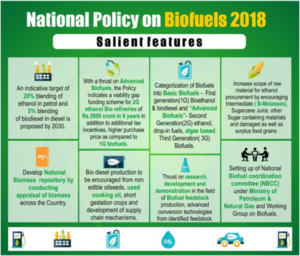National Policy on Biofuels – 2018
Context:
Rajasthan has become the first State in the country to implement the national policy on biofuels unveiled by the Centre in May this year.
The desert State will lay emphasis on increasing production of oilseeds and establish a Centre for Excellence in Udaipur to promote research in the fields of alternative fuels and energy resources.
The policy on biofuels seeks to help farmers dispose of their surplus stock in an economic manner and reduce the country’s oil import dependence.
It has expanded the scope of raw material for ethanol production by allowing the use of sugarcane juice, sugar-containing materials, starch-containing materials and damaged foodgrains like wheat, broken rice and rotten potatoes for ethanol production.
The State Rural Livelihood Development Council would also encourage women’s self-help groups to explore the scope for additional income through the supply of biodiesel.
About National Policy on Biofuels – 2018
The Policy categorises biofuels as “Basic Biofuels” viz. First Generation (1G) bioethanol & biodiesel and “Advanced Biofuels” – Second Generation (2G) ethanol, Municipal Solid Waste (MSW) to drop-in fuels, Third Generation (3G) biofuels, bio-CNG etc. to enable the extension of appropriate financial and fiscal incentives under each category.
It expands the scope of raw material for ethanol production by allowing the use of Sugarcane Juice, Sugar-containing materials like Sugar Beet, Sweet Sorghum, Starch-containing materials like Corn, Cassava, Damaged food grains like wheat, broken rice, Rotten Potatoes, unfit for human consumption for ethanol production.
It seeks to help farmers dispose of their surplus stock in an economic manner and reduce country’s oil import dependence.







